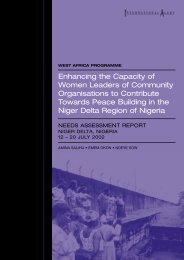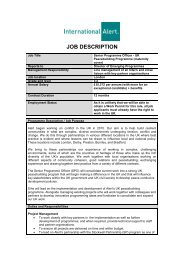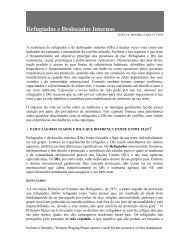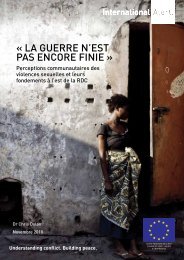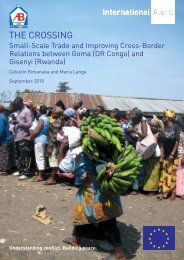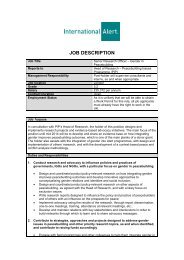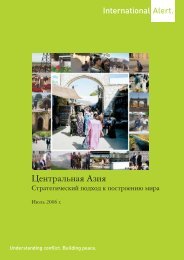Walking in the Dark: informal Cross-border trade ... - International Alert
Walking in the Dark: informal Cross-border trade ... - International Alert
Walking in the Dark: informal Cross-border trade ... - International Alert
Create successful ePaper yourself
Turn your PDF publications into a flip-book with our unique Google optimized e-Paper software.
<strong>Walk<strong>in</strong>g</strong> <strong>in</strong> <strong>the</strong> <strong>Dark</strong>: Informal <strong>Cross</strong>-<strong>border</strong> Trade <strong>in</strong> <strong>the</strong> Great Lakes Region<br />
25<br />
5. Taxation<br />
Taxes and state <strong>border</strong> agencies play an important role <strong>in</strong> cross-<strong>border</strong> <strong>trade</strong>. This section provides<br />
an analysis of <strong>the</strong> taxes collected at <strong>the</strong> different <strong>border</strong> po<strong>in</strong>ts and <strong>the</strong> behaviour of <strong>the</strong> various<br />
services <strong>in</strong>volved. As <strong>the</strong>se services are national <strong>in</strong>stitutions, we will analyse <strong>the</strong> situation <strong>in</strong> each<br />
country. Informal taxes – especially <strong>in</strong> <strong>the</strong> Congo and Burundi – are a major problem. These are<br />
taxes which we def<strong>in</strong>e as be<strong>in</strong>g collected outside of <strong>the</strong> state’s regulatory framework and as go<strong>in</strong>g<br />
unrecorded. In many cases <strong>the</strong>y are not collected on <strong>the</strong> basis of a particular regulation, edict or<br />
law and are, <strong>the</strong>refore, illegal. In o<strong>the</strong>r cases <strong>the</strong>y are collected on <strong>the</strong> basis of a regulation or law<br />
but are not paid <strong>in</strong>to state coffers. The fact that <strong>the</strong>se taxes are <strong>in</strong>formal does not necessarily mean<br />
that <strong>the</strong>y make no contribution to public goods and services, for example by add<strong>in</strong>g to <strong>the</strong> very<br />
low salaries received by public officials. In this context, and specifically <strong>in</strong> reference to what was<br />
<strong>the</strong>n Zaire, Prud’homme uses <strong>the</strong> term “<strong>in</strong>formal taxes”, which he def<strong>in</strong>es as ‘<strong>in</strong>formal means of<br />
f<strong>in</strong>anc<strong>in</strong>g <strong>the</strong> provision of public goods and services’. 50<br />
In order to facilitate this study, <strong>the</strong> <strong>in</strong>dicator used for formal taxes was <strong>the</strong> issuance of a receipt<br />
to prove a tax had been paid. The <strong>in</strong>dicator used for <strong>in</strong>formal taxes was <strong>the</strong> absence of a receipt<br />
issued to <strong>the</strong> <strong>trade</strong>r.<br />
The taxes referred to below (both formal and <strong>in</strong>formal) relate to all costs paid by <strong>trade</strong>rs <strong>in</strong> <strong>the</strong><br />
context of cross-<strong>border</strong> <strong>trade</strong> and communicated as such to our <strong>in</strong>terviewers. This <strong>in</strong>cludes not<br />
only import and export taxes, but also immigration costs borne by <strong>trade</strong>rs as well as market and<br />
municipal taxes, which are often collected at or near <strong>the</strong> <strong>border</strong>.<br />
It is necessary to nuance <strong>the</strong> def<strong>in</strong>ition of <strong>in</strong>formal taxes somewhat: as we have just said, <strong>the</strong><br />
issuance of receipts was used as an <strong>in</strong>dicator of <strong>the</strong> level of <strong>in</strong>formal taxation. However, <strong>the</strong><br />
<strong>in</strong>formal nature of taxation is <strong>in</strong> reality much more widespread: at certa<strong>in</strong> sites, such as Cibitoke,<br />
<strong>trade</strong>rs admitted that <strong>the</strong>y did not always say when <strong>the</strong>y had paid <strong>in</strong>formal taxes <strong>in</strong> Burundi<br />
because <strong>the</strong>y ‘don’t want <strong>the</strong>ir secret to be revealed’. 51 A similar phenomenon was observed <strong>in</strong><br />
Arua/Ariwara, where <strong>trade</strong>rs did not want to own up to all <strong>the</strong> <strong>in</strong>formal taxes paid <strong>in</strong> DRC for<br />
fear of reprisals. In some locations parallel receipts are used, strictly for <strong>in</strong>ternal use only, but are<br />
not taken <strong>in</strong>to account and are not a reflection of state regulations. For example, at one Congolese<br />
<strong>border</strong> cross<strong>in</strong>g such receipts are used for <strong>the</strong> payment of <strong>in</strong>formal revenue between officials.<br />
Similarly, at some <strong>border</strong> sites, prov<strong>in</strong>cial government offices collect taxes even though <strong>the</strong>y have<br />
no authorisation to operate <strong>in</strong> <strong>the</strong>se locations. One common practice at all <strong>border</strong> locations is to<br />
declare a lower amount than actually paid: for example, a <strong>trade</strong>r import<strong>in</strong>g goods for which he<br />
must pay USD30 is issued a receipt for USD15 and actually pays <strong>the</strong> tax collector USD20. This is<br />
a w<strong>in</strong>-w<strong>in</strong> situation for both <strong>in</strong>dividuals, while <strong>the</strong> state loses out.<br />
To summarise, <strong>the</strong> <strong>in</strong>dicator used to dist<strong>in</strong>guish between formal and <strong>in</strong>formal taxes gives us a<br />
good idea of <strong>the</strong> levels of taxation, but <strong>in</strong> reality <strong>the</strong> level of <strong>in</strong>formal taxation is much higher than<br />
<strong>the</strong> percentages provided below.<br />
Before go<strong>in</strong>g on to analyse <strong>the</strong> situation <strong>in</strong> each <strong>in</strong>dividual country, we will exam<strong>in</strong>e <strong>the</strong> various<br />
regional agreements which (ostensibly) regulate national fiscal policies.<br />
50 R. Prud’homme (1992). ‘Informal local taxation <strong>in</strong> develop<strong>in</strong>g countries’, Environment and Plann<strong>in</strong>g C: Government and Policy, 10, p.1-17,<br />
p.2. The author draws a dist<strong>in</strong>ction between <strong>the</strong> various <strong>in</strong>formal taxes, such as “p<strong>in</strong>ces”, extortion, requests, contributions, gifts and<br />
donations.<br />
51 <strong>Cross</strong>-<strong>border</strong> <strong>trade</strong>rs focus group, Cibitoke, 24th October 2011.



